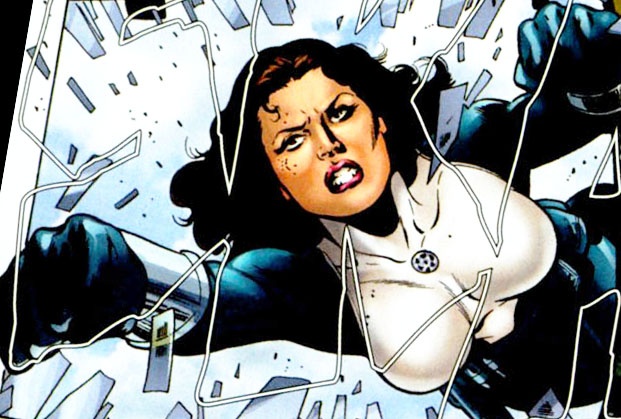
Why Marvel’s Mossad Superheroine Sabra
Is All Kinds of Wrong
Belén Fernández / Opinion Al Jazeera
(September 24, 2022) — Over a period of two days just outside Beirut in September 1982, Israeli-backed Lebanese militiamen slaughtered up to 3,500 Palestinian refugees and Lebanese civilians in what became known as the Sabra and Shatila massacre. Pregnant women were stabbed in the stomach; foetuses were ripped out. Children had their throats cut; young men were lined up and shot in the back.
Israel’s military provided logistical support throughout the butchery, which occurred three months into the apocalyptic Israeli invasion of Lebanon that had been green-lit by the United States.
So it was not the most appropriate timing in the world when, on the eve of the 40th anniversary of the Sabra and Shatila massacre this month, Disney’s Marvel Studios announced that its film, Captain America: New World Order, slated for release in 2024, would feature an Israeli character called Sabra. This little-known character made her Marvel Comics debut in the 1980s as the “super heroine of the state of Israel,” and will be played by Israeli actress Shira Haas.
And while her name is not a reference to the massacre in Lebanon, the whole thing is still super problematic.
Consider Sabra’s backstory. In issue 256 of The Incredible Hulk, published in 1981, she appears as a kibbutz-raised superhuman mutant holding down a day job as an Israeli police officer but whose real gig is with the country’s spy agency, Mossad. Decked out in an Israeli flag-inspired costume, Sabra is “determined to preserve her homeland from the ravages of the Hulk,” as one of the comic’s captions informs us.
Never mind Israel’s starring role in ravaging other people’s homelands, starting with that state’s very birth in 1948, when some 500 Palestinian villages were destroyed, more than 10,000 Palestinians were killed and at least three-quarters of a million more were made refugees in their own land.
Since Israel’s flair for ethnic cleansing and massacres hasn’t exactly abated over the past 74 years – just look at the ongoing terrorisation of the Gaza Strip – it is all kinds of wrong to bring to the silver screen a character who puts a superheroine’s cape on state savagery.
While the plot details of Captain America: New World Order have not been revealed, many see the film as a public relations coup for Mossad, an outfit known for extrajudicial assassinations and all manner of other misdeeds. To date, the agency has received plenty of favourable screen time, from The Spy on Netflix to Apple TV’s Tehran. Now, Marvel has bumped Mossad up a level to full-blown superhero status.
CNN quotes Avner Avraham – a former Israeli spy who currently self-defines as a “world-renowned expert in Mossad operations” as well as an “exhibition and films producer and curator” – on how Sabra will facilitate the agency’s “branding” with younger audiences: “This is the ‘TikTok’ way, the cartoon way to talk to the new generation.” Avraham also speculates that such marketing may make it easier for Mossad to recruit sources abroad.
Alas, just when you thought pop culture might be heading in a slightly more human direction with the likes of the new Netflix series Mo and Marvel’s own Ms Marvel, leave it to Hollywood to yank us back to the, um, “new world order”.
Granted, Israel’s approach to the Palestinians is already often cinematic – from blowing up apartment buildings in the Gaza Strip to launching air strikes against children playing football on the beach. So cinematic, in fact, that bombardments of the besieged Palestinian coastal enclave have been known to draw Israeli crowds with camping chairs and popcorn.
Sabra’s crowd appeal remains to be seen, but it’s safe to surmise the character will help endow Israeli crimes with a veneer of feminist progressivism à la Gal Gadot, the former Israeli soldier and diehard military fan who starred in Wonder Woman 1984, among other nausea-provoking exploits.
In issue 256 of The Incredible Hulk, a footnote explains that the word sabra “denotes a native-born Israeli, the name derived from an indigenous form of fruit – a prickly pear possessed of a sweet interior, and a spiny outer surface to protect it from its enemies”.
Of course, Israel’s national mythology rests on the idea that Israelis are somehow “indigenous” to the land. But as a 2014 Times of Israel dispatch specifies, the Hebrew word for prickly pear “comes from the Arabic term, learned by Polish immigrants when they first came upon the plant”. The New York Times Crossword Stumper defines sabra as “a Jewish person who was born in Israel” but underscores that the term is “related to the Arabic word sabr, which means patience and perseverance”.
And according to Oz Almog’s book, The Sabra: The Creation of the New Jew, the Sabras were “the first Israelis – the first generation, born in the 1930s and 1940s, to grow up in the Zionist settlement in Palestine”. How’s that for indigenous?
The moral of the story, in short, is that on top of all the Mossad and military stuff, the superheroine Sabra also represents a multidimensional Israeli occupation of Palestine that is at once territorial and linguistic.
For those who like their Zionism with a side of popcorn, Marvel’s latest offering is certain to be a treat.
Belén Fernández is the author of Checkpoint Zipolite: Quarantine in a Small Place (OR Books, 2021), Exile: Rejecting America and Finding the World (OR Books, 2019), Martyrs Never Die: Travels through South Lebanon (Warscapes, 2016), and The Imperial Messenger: Thomas Friedman at Work (Verso, 2011). She is a contributing editor at Jacobin Magazine, and has written for the New York Times, the London Review of Books blog, Current Affairs, and Middle East Eye, among numerous other publications.
The views expressed in this article are the author’s own and do not necessarily reflect Al Jazeera’s editorial stance.